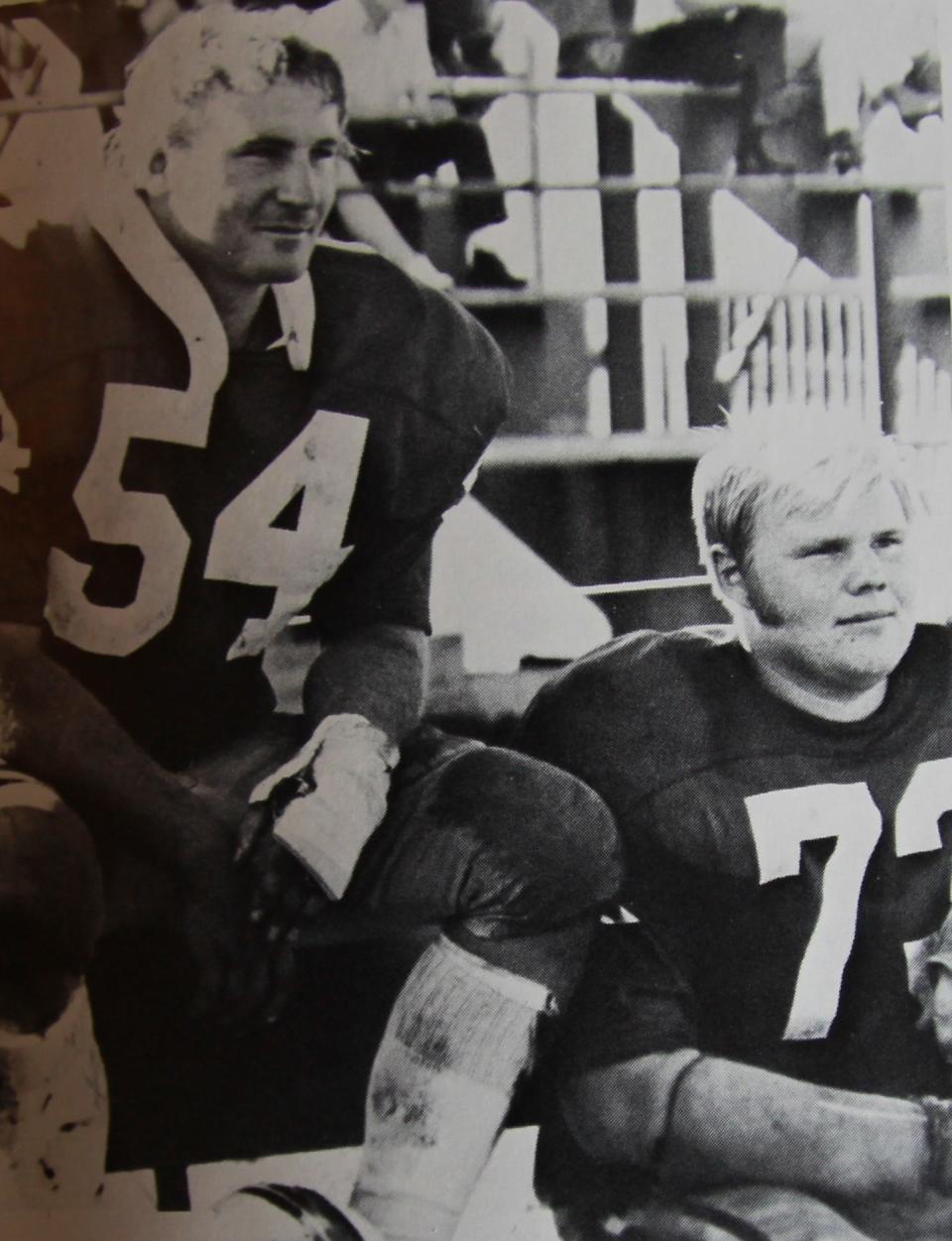Golden Scots: Reichow challenged each and every one of his Monmouth players

MONMOUTH — As former Fighting Scots look back on the 1972 season, some memories are better than others on the sequence of events that led to each of the nine victories.
But one takeaway remains clear, and it was shared by several of the men now in their 70s.
“Coach (Reichow) challenged us all, ‘Are you willing to pay the price to reach the goal?’” said Rod Davies. “The pain and the sacrifice to reach the goal. Every night, it was the goal-line stand drill. We beat ourselves up so bad in practice that the games were easy.”
There was also a 1-on-1 hitting drill “every day” in practice,” recalled Davies.
“They had to separate us so many times,” said Bill Breedlove of the inevitable skirmishes that came out of the physical, competitive practices. “We had a lot of depth on that team, so you were out there trying to keep your spot every day against someone who wanted to take it.”
Bill Honeycutt said there was a dreaded five-word command that Reichow often barked at practice: “Line up! Face the sun.”
That meant the team would be running lines, first heading west along the goal-line to the opposite sideline, then coming back east on the 5-yard line. That pattern would continue at every five-yard increment to the other goal-line. That’s more than a 50-yard run, done 21 times.
“You couldn’t let anybody pass you. That was the toughest one,” said Tom Kratochvil. “We didn’t do it every day. Just once a week or once every two weeks if he thought we were slacking in practice. His job was to get us prepared, and that’s what he did.”
“There was a strike at Wilson’s, the meat-packing plant in town,” said Honeycutt. “I remember at one practice, Coach told us they needed 15 or 20 guys to help unload 1,200 hogs. He asked who wanted to help. You could not run fast enough to help out and get out of that day’s running. ... I always thought, if we can get to the fourth quarter, we’ll never lose from being out of shape. He ran the hell out of us.”
“We were just confident,” said Davies of the team’s mood. “We weren’t a brash bunch. Coach had a way of keeping our egos in check.”
“He’d run it out of you,” said Greg Derbak.
Practices were supposed to end at 6 p.m., but the players often found they were running late for other campus activities because they were still running, late.
“Coach used to send out a summer letter to check on what everybody was doing in terms of getting ready for the season,” said Paul Waszak. “He’d get our responses, and then send them out in a second letter.”
“The first liars were tough to beat,” laughed Davies.
“His letter said what kind of shape you should be in, and what the consequences would be if you weren’t,” said Waszak.
“The ‘Breakfast Club,’” said Mike Castillo of more early morning running.
“It worked,” said Reichow.
But Reichow showed a compassionate side, too. Waszak recalled one such situation.
“We had a defensive tackle recruit, and he got trap-blocked on a play for our scout team and had a compound fracture of his leg. You could see the bone coming through the skin, and there was a severed artery. Coach went in with both hands to help the kid. He had the rest of the team go to the other end to keep scrimmaging. Just then, a cold mist blew over the field. The whole time, you could see him on the other end, staying with the kid until the medical help arrived. Then he came back down to our end and said, ‘OK, let’s go.’ And we were all like, ‘Yeah, let’s get going.’”
Grant Minor, another player who started off at a major university football program before transferring to Monmouth, shared a related story, but in a different setting.
“I was on the golf team, too, which he coached,” said Minor. “I’d been in a little bit of a slump. I got a call from him to meet him at the back door of the ATO house in 20 minutes. I thought, ‘Oh, !@#$, what did I do?’ He showed up in that red station wagon, and we went out to Gibson Woods. He had me hit shags with my 4-wood in a light rain, and he was out there shagging the balls for me. Coach really put in the effort, more than anybody I ever played for. We worked hard, we played hard, and I have very fond memories of it all.
“And one other thing,” added Minor. “He cured me of any desire I ever had to run.”
“He cured all of us,” said Davies. “Running that hill.”
“That hill was like a 45-degree angle,” said Kratochvil. “You ran up that baby, you got tired.”
“Everybody likes to win, but are you willing to play the price to make that happen,” said Minor. “That’s the stuff you walk away with from being a part of that team. That, and I learned how to hold from Bob Trombetta.”
Members of the 1972 team and other squads gathered in 2019 to celebrate Reichow’s 90th birthday. “Happy 90th, Coach, from the men you made,” read the icing on the cake.
“You paid the price, no question, and that’s why we’re here,” said Reichow that day. “Had you not paid that price, this day wouldn’t have occurred. So thank you, every one of you, thank you. You don’t know how much I appreciate it.”
This article originally appeared on Galesburg Register-Mail: NCAA Football: ‘Are you willing to pay the price to reach the goal?’

